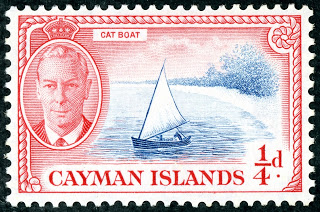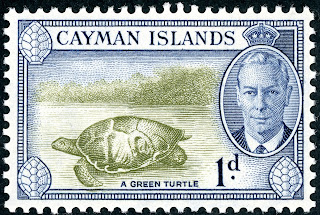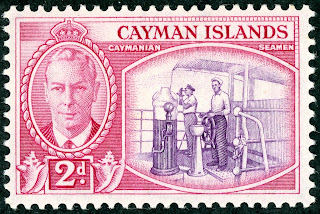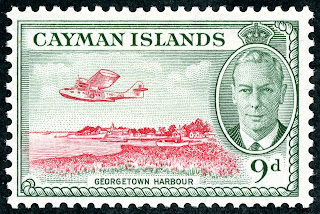Cayman Islands 1950 Issue & War Tax – a closer look
By Jim Jackson FromBigBlue 1840-1940 blogspot
Into the Deep Blue
British Commonwealth issues, for those of us that like pictorials, have a reputation as a bit staid and stuffy with issue after issue showing the Queen or King and not much else.
So it is a delight when that rule is broken.
The bi-colored Cayman Islands issue of 1950 is lovely, and we will spend some time with this post taking a look!

Cayman Islands 1900-1947 – a closer look
Cayman Islands & BB Checklist


1950 Scott 127 2 1/2p sepia & aquamarineCayman Islands: Grand Cayman, Little Cayman, & Cayman BracClassical map image of the Cayman Islands and George VI.
A Closer Look
12 Pence = 1 Shilling
20 Shilling = 1 Pound


1950 Scott 123 1/2p blue green & red violet“Coconut Grove, Cayman Brac”Does anything say island paradise more than swaying coconut palms?


1950 Scott 124 1p deep blue & olive”Green Turtle”Christopher Columbus called the Cayman Islands “Las Tortugas” in 1503 because of the abundance of the green sea turtles. Today they are less prevalent. But the largest tourist attraction (500,000 visitors annually) is the Cayman Turtle Centre, where breeding and conservation measures are in force.


1950 Scott 125 1 1/2p chocolate & blue green“Thatch Rope Industry”The fibers from the silver thatch palm were used to make rope, a local traditional industry. Today, one can buy bags and hats made from the material at the craft markets.


1950 Scott 126 2p rose carmine & violet“Caymanian Seamen”The 1950 George VI issue consists of thirteen pictorial stamps, all engraved and bi-colored. CV ranges from <$1 to $20+. Naturally, the designs were frugally used again for the Elizabeth II issue of 1953-62.


1950 Scott 128 3p blue & blue green“Parrot Fish”Around the coral reefs are found the colorful Parrot Fish. One is likely to encounter them while snorkeling. As they feed of the coral, they make a “crunching” noise, and can produce a pond of sand yearly.


1950 Scott 129 6p deep blue & orange brown“Bluff, Cayman Brac”Cayman Brac is known for the 140 foot cliff made out of limestone. In fact, the island was named after this feature. “Brac” in Gaelic means “Bluff”.


1950 Scott 130 9p deep green & rose red”Georgetown Harbor”
George Town presently has a population of 28,000, making it the second largest city of the British Overseas Territories.


1950 Scott 131 1sh red orange & brownTurtle “Crawl”Turtles are the national dish of the Cayman Islands, but surveys show only 30% of the population eat turtles, and it is not popular with tourists.


1950 Scott 132 2sh red violet & violet“Cayman Schooner”Over 300 schooners were built in the Caymans. The mahogany found on the islands was used for the ship frames.


1950 Scott 133 5sh violet & olive“Boat Building”As I mentioned in the Cayman Islands 1900-1947 post, Shipbuilding was a thriving industry in the Caymans. Now it is tourism, snorkeling, off-shore banking and a tax haven.


1917 Scott MR4 1 1/2p on 2 1/2p ultramarine “George V”War Stamp – Surcharged (Type SG 17)One of the great War Stamp rarities is based on the September 4, 1917 1 1/2p on 2 1/2p ultramarine surcharge – unfortunately not this one, the common SG Type Surcharge 17- (CV <$1). When De La Rue shipped these stamps, there were about 3 sheets included in the consignment with a type surcharge error (Scott MR3): SG Type Surcharge (16 – CV $800+ unused). A Word: use the SG catalogue to see the difference in the surcharge type- do not trust the image in Scott.


1919 Scott MR5 1/2p green1912 Scott 33 OverprintedThe February 4, 1919 MR4 has been reported to have a “Brownish paper” variety. This merely turns out to be caused by the interleaving used for shipment.


1919 Scott MR6 1 2/p on 2 1/2p orangeType of 1912-16 SurchargedThere are seven major numbers (MR1-MR7) for the war stamps of the Cayman Islands. CV (except for the great rarity MR3 (see above)) is a modest <$1 to $10+.


1920 Scott MR7 1 1/2p on 2p gray1912 Scott 35 SurchargedThis too (MR7) had a “rose-tinted paper” variety reported: again caused by the interleaving used during shipment. These “tinted paper” varieties were given higher CVs in some catalogues (Minkus) in the past.


1950 Scott 134 10sh rose red & black“Government Offices, Grand Cayman’Out of the BlueI hoped you enjoyed the high resolutions scans of this nicely done 1950 Cayman Islands set!
A is for Aden and Z is for Zanzibar… Now what is between? For the world wide classical era philatelist and stamp collector, a country specific philatelic survey is offered by the blog author, Jim Jackson, with two albums: Big Blue, aka Scott International Part 1 (checklists available), and Deep Blue, aka William Steiner’s Stamp Album Web PDF pages. In addition, “Bud” offers commentary and a look at his completely filled Big Blue. Interested? So into the Blues…
For more on this story go to: https://bigblue1840-1940.blogspot.com/2020/01/cayman-islands-1950-issue-war-tax.html





Need to correct the article. There is no way in 1950 that the population of George Town or even the Cayman Islands was 26,000.